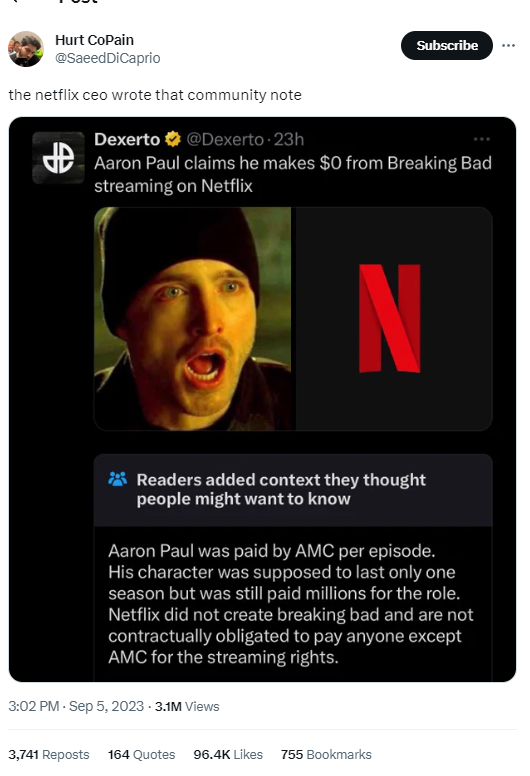this post was submitted on 06 Sep 2023
200 points (100.0% liked)
Movies & TV
22891 readers
160 users here now
Rules for Movies & TV Discussion
-
Any discussion of Disney properties should contain a (cw: imperialism) tag. If your post isn't tagged appropriately it will be removed.
-
Anti-Bong Joon-ho trolling will result in an immediate ban from c/movies and submitted to the site administrators for review.
-
On Star Trek Sunday only posts discussing how we might achieve space communism are permitted. Non-Star Trek related content will be removed and you will be temporarily banned until the following Sunday.
Here's a list of tons of leftist movies.
founded 4 years ago
MODERATORS
you are viewing a single comment's thread
view the rest of the comments
view the rest of the comments

Well for one, because residuals are an industry standard for a reason. The fact that residuals dont exist for streaming services is seen as a problem by these workers, and we should support them.
Second, because corporations are making huge profits off recycling the labor of these workers. And not all of the workers involved are making money like Aaron Paul does. SAG-AFTRA doesn't just represent superstar actors that make millions. Corporations are making continued profit off a person's work and with streaming services they are the ONLY ones making those profits. The workers are only asking for a slice of that, which is less than they should be asking for.
To be clear, I think the camera guy should get residuals too. I think everyone involved should. The barn example is an interesting one because it does bring to mind that entertainment workers differently from other industries in this way, but at the end of the day I support the union in whatever they seek to get from the filthy capitalist pigs lol.
I fully support the workers protesting for whatever form of payment they want. There's no reason why streaming services shouldn't pay residuals if that's what the workers want.
That doesn't mean they're entitled to additional compensation for labour they've already done. If they did the work for an agreed price that wasn't linked to the future profits then they shouldn't complain just because the future profits are greater than expected. Equally if you take your compensation as a share of the future profits, you can't complain if they're lower than expected.
The grey area in all this is when contracts have been badly worded and the rights holders are trying to use these loopholes unfairly. If someone negotiated to be paid $X every time an episode is aired, it creates a big problem with the rise of non-broadcast TV. It's not realistic to claim that a show is 'aired' every time a single person streams it, but equally it's not fair say they aren't being aired at all just because they're streaming on demand instead.
I don't know what the best solution is. Future contracts will certainly be worded with streaming mind, but what (if anything) should be done about previous contracts is a much more difficult issue.
You do realize projects are budgeted, and the studios say. “We don’t have money to do that” so they don’t pay people a lot upfront, and offer the actors and writers packages to get paid once the project is completed. This is how it worked for a century and then streaming came in and offered these two groups nothing.
People are paying for the streaming services for the content of shows and movies they hold, not because of software choices by streaming services. So if those are the breadwinners, and Netflix is making ads showing off their breaking bad content, then I thin it’s okay for them to want royalties from these services.
The solution is to make streaming services like TV packages where everyone pays $80 a month.